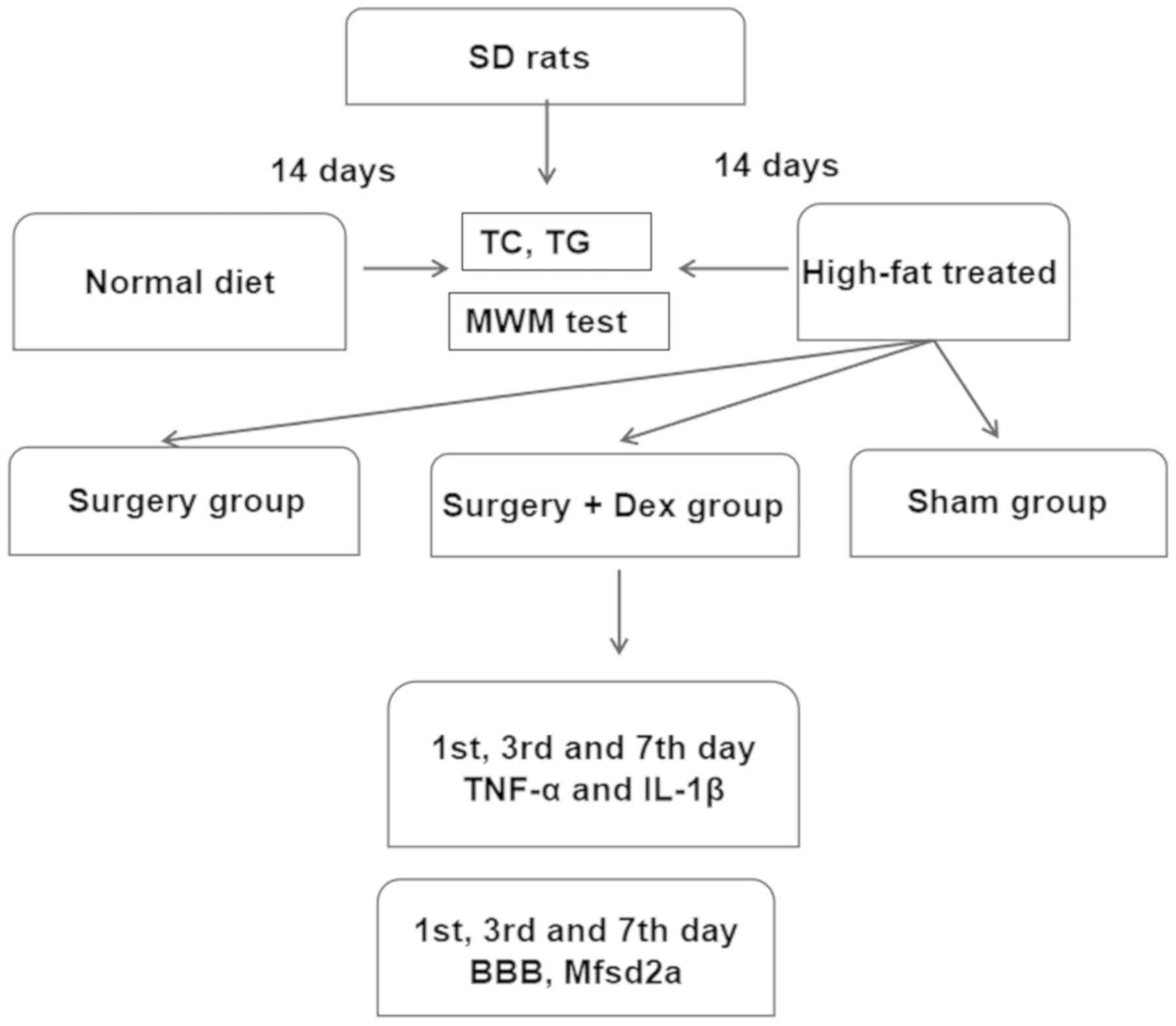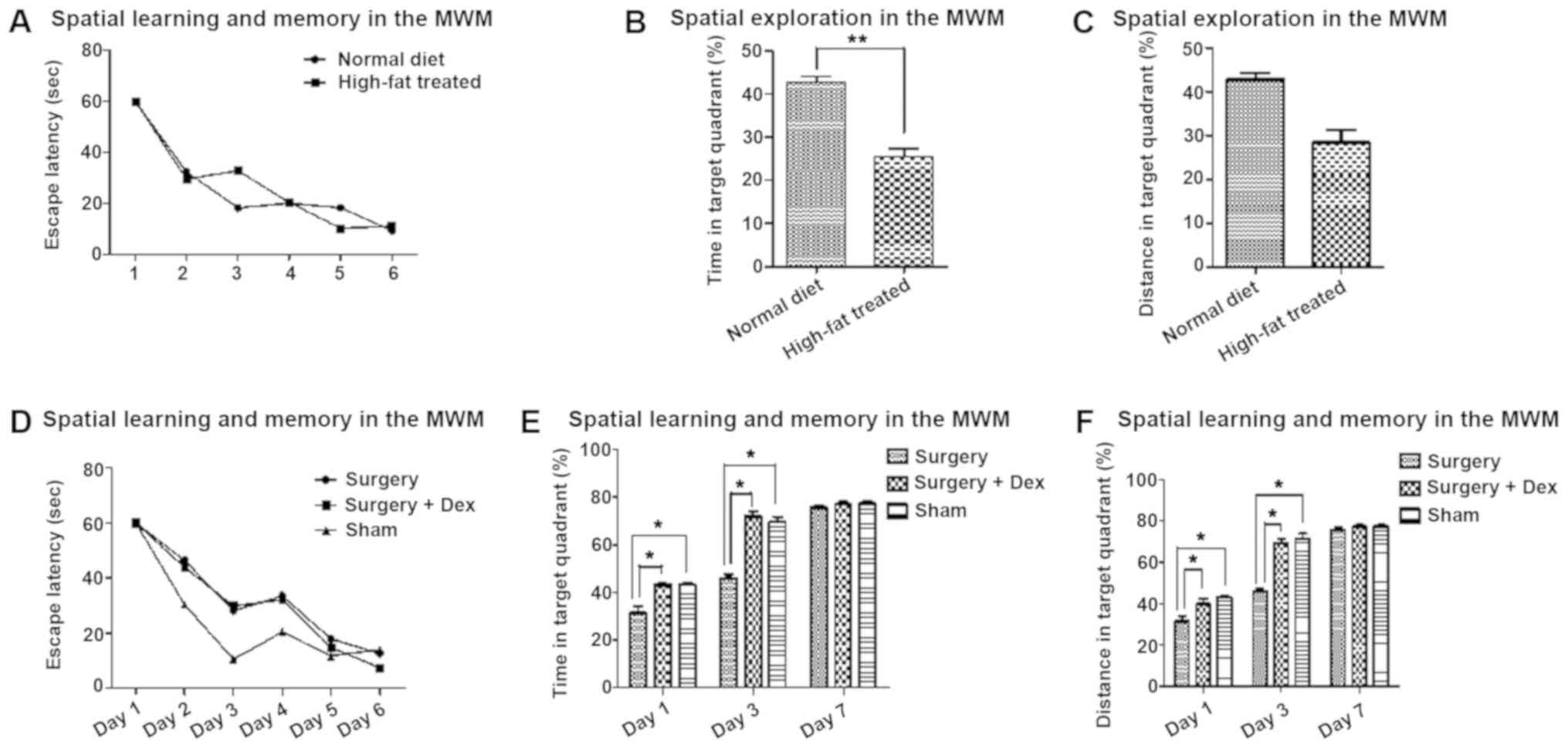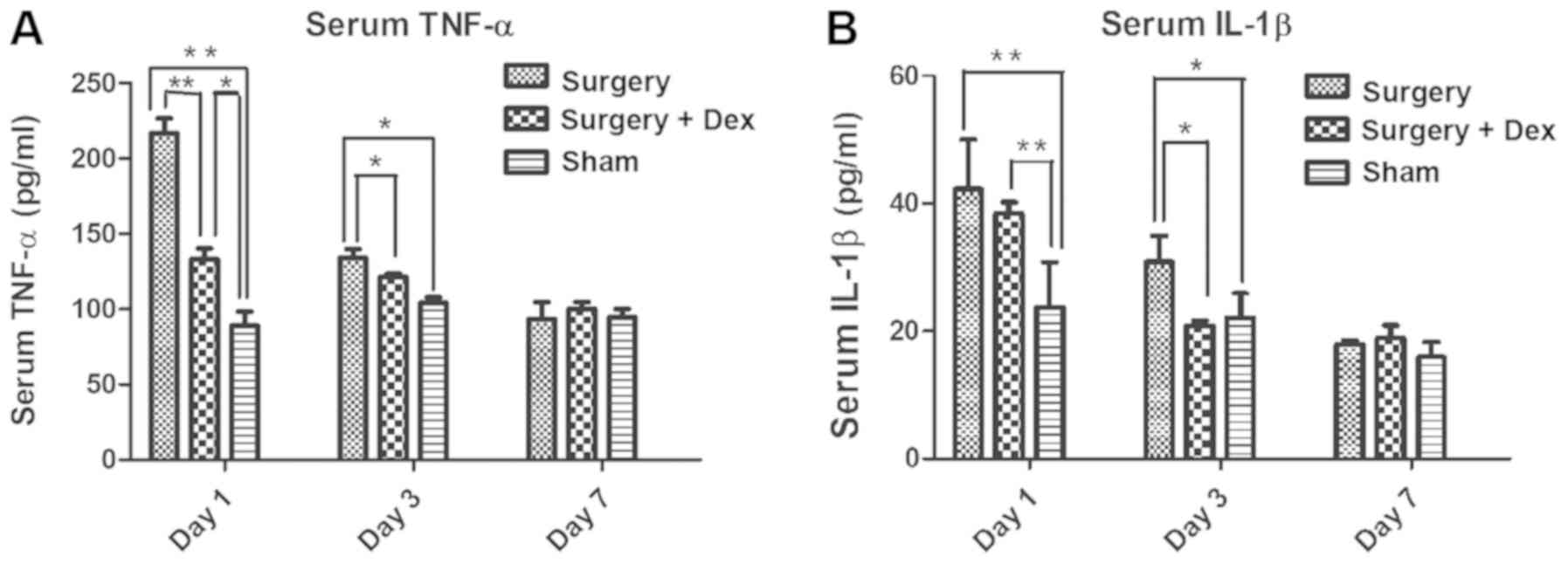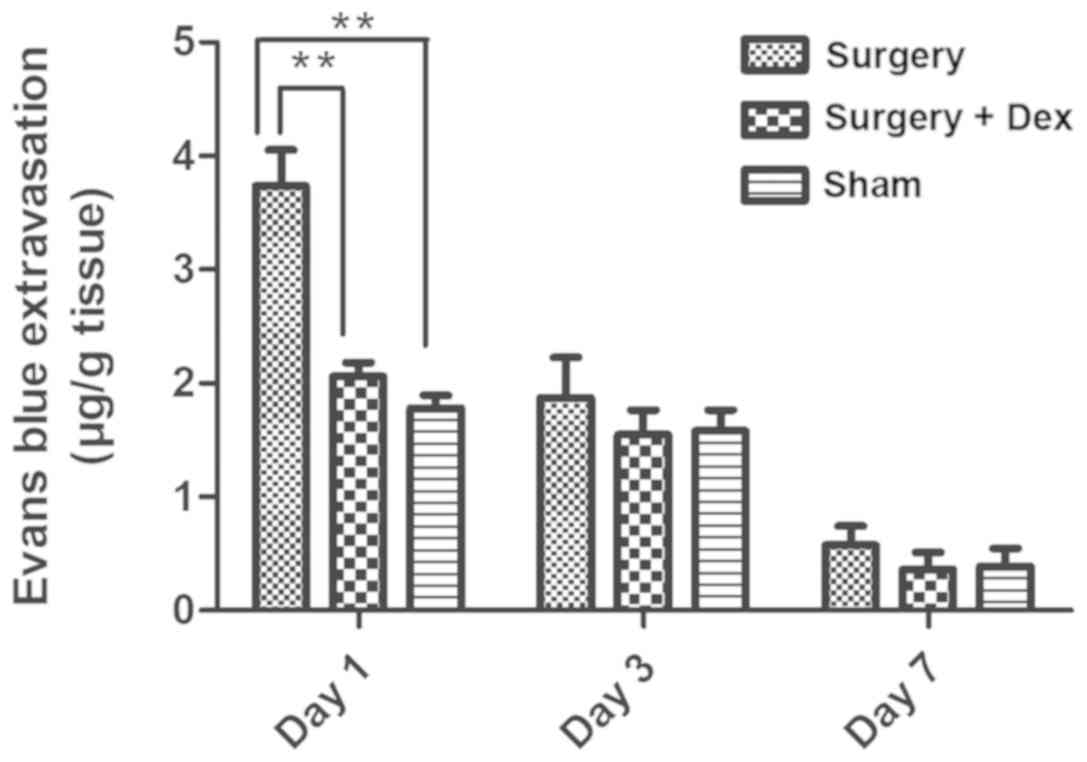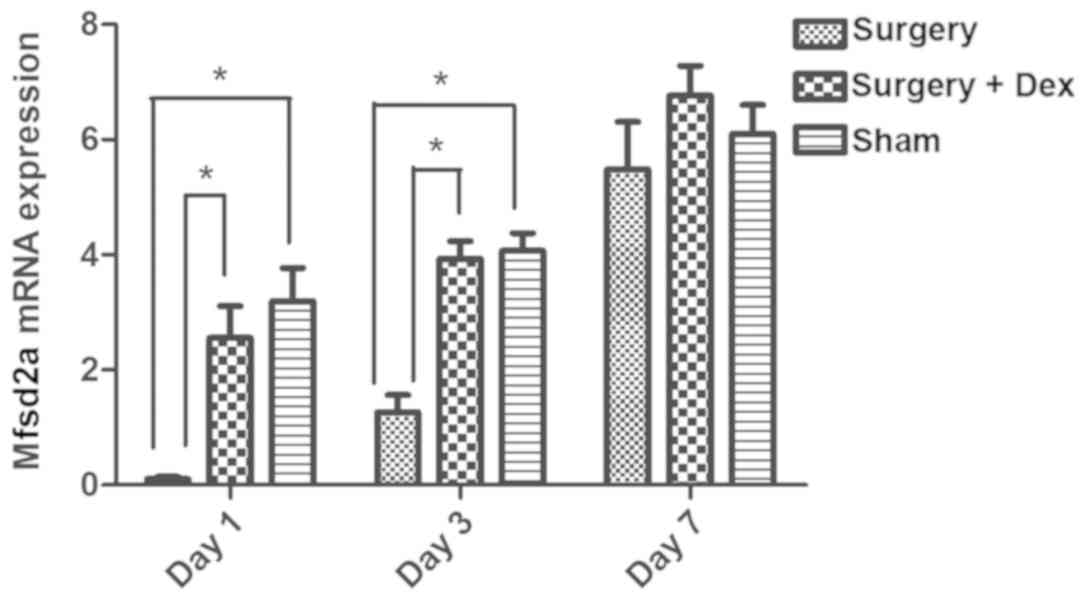|
1
|
Pappa M, Theodosiadis N, Tsounis A and
Sarafis P: Pathogenesis and treatment of post-operative cognitive
dysfunction. Electron Physician. 9:3768–3775. 2017. View Article : Google Scholar : PubMed/NCBI
|
|
2
|
Bilotta F, Qeva E and Matot I: Anesthesia
and cognitive disorders: A systematic review of the clinical
evidence. Expert Rev Neurother. 16:1311–1320. 2016. View Article : Google Scholar : PubMed/NCBI
|
|
3
|
Price CC, Garvan CW and Monk TG: Type and
severity of cognitive decline in older adults after noncardiac
surgery. Anesthesiology. 108:8–17. 2008. View Article : Google Scholar : PubMed/NCBI
|
|
4
|
Lin Y, Chen J and Wang Z: Meta-analysis of
factors which influence delirium following cardiac surgery. J Card
Surg. 27:481–492. 2012. View Article : Google Scholar : PubMed/NCBI
|
|
5
|
Loffler T, Flunkert S, Temmel M and
Hutter-Paier B: Decreased plasma Abeta in hyperlipidemic APPSL
transgenic mice is associated with BBB dysfunction. Front Neurosci.
10:2322016. View Article : Google Scholar : PubMed/NCBI
|
|
6
|
Ullrich C, Pirchl M and Humpel C:
Hypercholesterolemia in rats impairs the cholinergic system and
leads to memory deficits. Mol Cell Neurosci. 45:408–417. 2010.
View Article : Google Scholar : PubMed/NCBI
|
|
7
|
Cunha S, Amaral MH, Lobo JM and Silva AC:
Therapeutic strategies for Alzheimer's and Parkinson's diseases by
means of drug delivery systems. Curr Med Chem. 23:3618–3631. 2016.
View Article : Google Scholar : PubMed/NCBI
|
|
8
|
Acharya NK, Goldwaser EL, Forsberg MM,
Godsey GA, Johnson CA, Sarkar A, DeMarshall C, Kosciuk MC, Dash JM,
Hale CP, et al: Sevoflurane and Isoflurane induce structural
changes in brain vascular endothelial cells and increase
blood-brain barrier permeability: Possible link to postoperative
delirium and cognitive decline. Brain Res. 1620:29–41. 2015.
View Article : Google Scholar : PubMed/NCBI
|
|
9
|
Ben-Zvi A, Lacoste B, Kur E, Andreone BJ,
Mayshar Y, Yan H and Gu C: Mfsd2a is critical for the formation and
function of the blood-brain barrier. Nature. 509:507–511. 2014.
View Article : Google Scholar : PubMed/NCBI
|
|
10
|
Berger JH, Charron MJ and Silver DL: Major
facilitator superfamily domain-containing protein 2a (MFSD2A) has
roles in body growth, motor function, and lipid metabolism. PLoS
One. 7:e506292012. View Article : Google Scholar : PubMed/NCBI
|
|
11
|
Guerriero F, Sgarlata C, Francis M,
Maurizi N, Faragli A, Perna S, Rondanelli M, Rollone M and Ricevuti
G: Neuroinflammation, immune system and Alzheimer disease:
Searching for the missing link. Aging Clin Exp Res. 29:821–831.
2016. View Article : Google Scholar : PubMed/NCBI
|
|
12
|
Barrientos RM, Hein AM, Frank MG, Watkins
LR and Maier SF: Intracisternal interleukin-1 receptor antagonist
prevents postoperative cognitive decline and neuroinflammatory
response in aged rats. J Neurosci. 32:14641–14648. 2012. View Article : Google Scholar : PubMed/NCBI
|
|
13
|
Jolkkonen J, Puurunen K, Koistinaho J,
Kauppinen R, Haapalinna A, Nieminen L and Sivenius J:
Neuroprotection by the alpha2-adrenoceptor agonist,
dexmedetomidine, in rat focal cerebral ischemia. Eur J Pharmacol.
372:31–36. 1999. View Article : Google Scholar : PubMed/NCBI
|
|
14
|
Mantz J, Josserand J and Hamada S:
Dexmedetomidine: new insights. Eur J Anaesthesiol. 28:3–6. 2011.
View Article : Google Scholar : PubMed/NCBI
|
|
15
|
Venn RM, Bryant A, Hall GM and Grounds RM:
Effects of dexmedetomidine on adrenocortical function, and the
cardiovascular, endocrine and inflammatory responses in
post-operative patients needing sedation in the intensive care
unit. Br J Anaesth. 86:650–656. 2001. View Article : Google Scholar : PubMed/NCBI
|
|
16
|
Goyagi T: Dexmedetomidine reduced
sevoflurane-induced neurodegeneration and long-term memory deficits
in neonatal rats. Int J Dev Neurosci. 75:19–26. 2019. View Article : Google Scholar : PubMed/NCBI
|
|
17
|
Akpinar H, Naziroglu M, Ovey IS, Cig B and
Akpinar O: The neuroprotective action of dexmedetomidine on
apoptosis, calcium entry and oxidative stress in cerebral
ischemia-induced rats: Contribution of TRPM2 and TRPV1 channels.
Sci Rep. 6:371962016. View Article : Google Scholar : PubMed/NCBI
|
|
18
|
Zhang C, Li J, Wang J, Song X, Zhang J, Wu
S, Hu C, Gong Z and Jia L: Antihyperlipidaemic and hepatoprotective
activities of acidic and enzymatic hydrolysis exopolysaccharides
from Pleurotus eryngii SI-04. BMC Complement Altern Med.
17:4032017. View Article : Google Scholar : PubMed/NCBI
|
|
19
|
Tomas Pereira I and Burwell RD: Using the
spatial learning index to evaluate performance on the water maze.
Behav Neurosci. 129:533–539. 2015. View Article : Google Scholar : PubMed/NCBI
|
|
20
|
Livak KJ and Schmittgen TD: Analysis of
relative gene expression data using real-time quantitative PCR and
the 2(-Delta Delta C(T)) method. Methods. 25:402–408. 2001.
View Article : Google Scholar : PubMed/NCBI
|
|
21
|
Hovens IB, Schoemaker RG, van der Zee EA,
Absalom AR, Heineman E and van Leeuwen BL: Postoperative cognitive
dysfunction: Involvement of neuroinflammation and neuronal
functioning. Brain Behav Immun. 38:202–210. 2014. View Article : Google Scholar : PubMed/NCBI
|
|
22
|
Hu N, Wang C, Zheng Y, Ao J, Zhang C, Xie
K, Li Y, Wang H, Yu Y and Wang G: The role of the
Wnt/β-catenin-Annexin A1 pathway in the process of
sevoflurane-induced cognitive dysfunction. J Neurochem.
137:240–252. 2016. View Article : Google Scholar : PubMed/NCBI
|
|
23
|
Vlisides P and Xie Z: Neurotoxicity of
general anesthetics: an update. Curr Pharm Des. 18:6232–6240. 2012.
View Article : Google Scholar : PubMed/NCBI
|
|
24
|
Bilotta F, Gelb AW, Stazi E, Titi L,
Paoloni FP and Rosa G: Pharmacological perioperative brain
neuroprotection: A qualitative review of randomized clinical
trials. Br J Anaesth. 110 (Suppl 1):i113–i120. 2013. View Article : Google Scholar : PubMed/NCBI
|
|
25
|
Di Cataldo V, Geloen A, Langlois JB,
Chauveau F, Theze B, Hubert V, Wiart M, Chirico EN, Rieusset J,
Vidal H, et al: Exercise does not protect against peripheral and
central effects of a high cholesterol diet given ad libitum
in old ApoE−/− mice. Front Physiol. 7:4532016.
View Article : Google Scholar : PubMed/NCBI
|
|
26
|
Vorhees CV and Williams MT: Morris water
maze: Procedures for assessing spatial and related forms of
learning and memory. Nat Protoc. 1:848–858. 2006. View Article : Google Scholar : PubMed/NCBI
|
|
27
|
Varatharaj A and Galea I: The blood-brain
barrier in systemic inflammation. Brain Behav Immun. 60:1–12. 2017.
View Article : Google Scholar : PubMed/NCBI
|
|
28
|
Elwood E, Lim Z, Naveed H and Galea I: The
effect of systemic inflammation on human brain barrier function.
Brain Behav Immun. 62:35–40. 2017. View Article : Google Scholar : PubMed/NCBI
|
|
29
|
Zhao Z and Zlokovic BV: Blood-brain
barrier: A dual life of MFSD2A? Neuron. 82:728–730. 2014.
View Article : Google Scholar : PubMed/NCBI
|
|
30
|
Paeschke N, von Haefen C, Endesfelder S,
Sifringer M and Spies CD: Dexmedetomidine prevents
lipopolysaccharide-induced microRNA expression in the adult rat
brain. Int J Mol Sci. 18:E18302017. View Article : Google Scholar : PubMed/NCBI
|
|
31
|
Wang D, Xu X, Wu YG, Lyu L, Zhou ZW and
Zhang JN: Dexmedetomidine attenuates traumatic brain injury: Action
pathway and mechanisms. Neural Regen Res. 13:819–826. 2018.
View Article : Google Scholar : PubMed/NCBI
|
|
32
|
Tanabe K, Matsushima-Nishiwaki R, Kozawa O
and Iida H: Dexmedetomidine suppresses interleukin-1beta-induced
interleukin-6 synthesis in rat glial cells. Int J Mol Med.
34:1032–1038. 2014. View Article : Google Scholar : PubMed/NCBI
|
|
33
|
Terrando N, Monaco C, Ma D, Foxwell BM,
Feldmann M and Maze M: Tumor necrosis factor-alpha triggers a
cytokine cascade yielding postoperative cognitive decline. Proc
Natl Acad Sci USA. 107:20518–20522. 2010. View Article : Google Scholar : PubMed/NCBI
|















